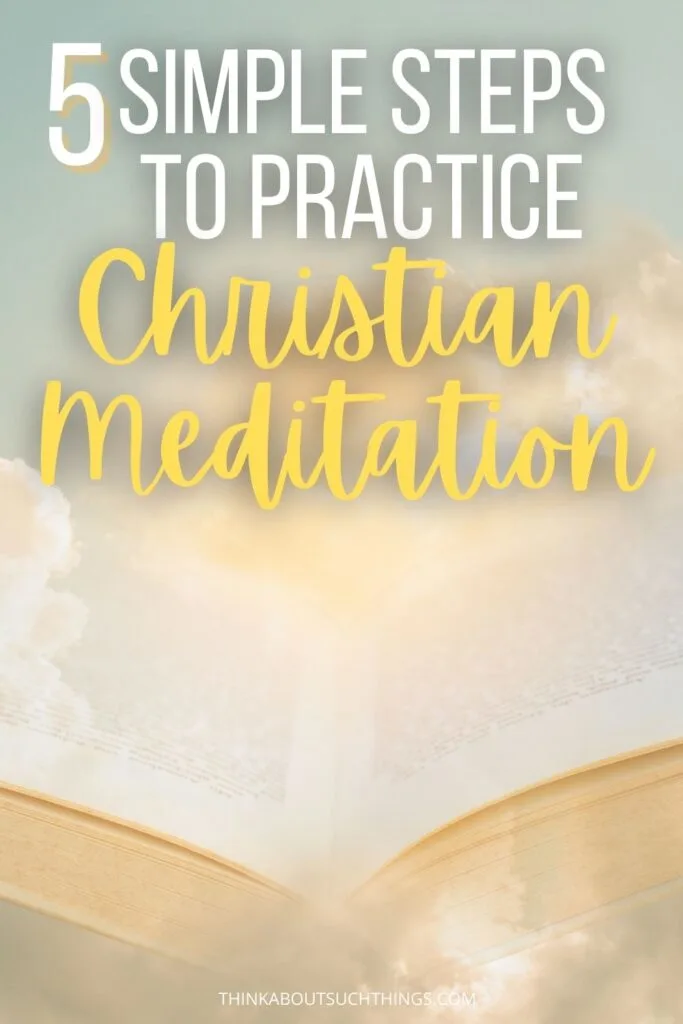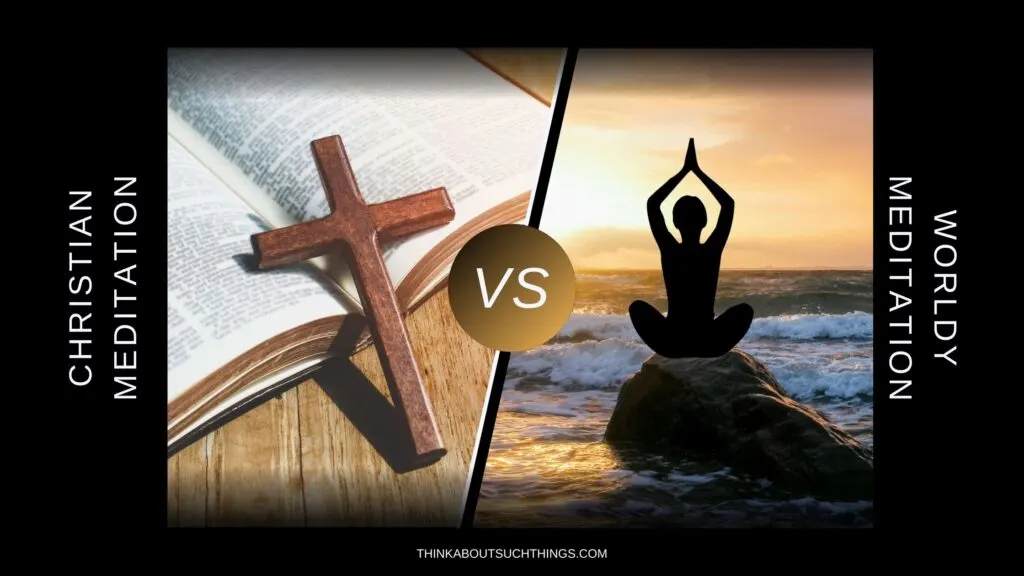In this article, we will cover Christian meditation and how we can take five easy ways to put it into practice in our daily lives. So, grab your Bible, and let’s begin…
The term ‘meditation’ has many different connotations and implications in the modern world, and it can be a confusing word for Christians, especially for those who had a new age background before Christ.
However, Christian meditation is a Biblical concept. Meditation done in the Lord and in a Biblical context is healthy and important for all Christians.
With that said, it is essential to understand what is meant when the Bible uses the word ‘meditation’ and to understand what it means for a Christian to meditate.
Christian meditation is not like the meditation of other religions and is very different from meditation in a worldly sense.
As we explore Christian meditation, find out what the Bible says about it, learn how to engage in Christian meditation, and discover what healthy meditation is for believers, you will learn the importance of this aspect of the Christian walk.

What Is Christian Meditation?
Meditation in the modern world context has brought with it some weird and strange practices that many people associate with non-Christian activities.
Most people equate meditation with new-age religious or ungodly practices, but the reality is that Christian meditation is Biblical. There are many verses within the scriptures that talk about meditation and even its benefits.
Christian meditation is the intentional process of dwelling on Scripture, spending time in prayer, focusing on the Lord, taking time to understand Scripture and the Word of God, developing a relationship with God.
It’s waiting for the Holy Spirit to give revelation, and reflecting on the meaning of Biblical principles and godly thoughts in the presence of God.
Meditation is used in the Bible in several places, but there are different Greek and Hebrew words used for meditation in the Bible.
For example, in Psalm 1:2, the Scripture says,
‘but his delight is in the Law of the Lord, and in His Law he meditates day and night.’
In this context, meditation is used to depict the reading and study of the Bible. The person who walks with God meditates in His Word, endeavors to understand it, and receives revelation from the Holy Spirit night and day.
The word ‘meditation’ in this context, [Strongs 1897], directly means ‘to ponder’ and implies deep thought.
This word is used to describe muttering, speaking, roaring, studying, murmuring, and imagining. All of these are expressions of meditation when a person is deeply ensconced in the Word.
הָגָה hâgâh, haw-gaw’; a primitive root (compare H1901); to murmur (in pleasure or anger); by implication, to ponder:—imagine, meditate, mourn, mutter, roar, × sore, speak, study, talk, utter.
Another example is found in Philippians 4:8, where Paul writes,
‘Finally, brethren, whatever things are true, whatever things are noble, whatever things are just, whatever things are pure, whatever things are lovely, whatever things are of good report, if there is any virtue, and if there is anything praiseworthy – meditate on these things.’
In this passage, the word used for ‘meditate’ translates as ‘to conclude,’ ‘to count,’ or ‘to think on’ [Strong’s Greek 3049].
λογίζομαι logízomai, log-id’-zom-ahee; middle voice from G3056; to take an inventory, i.e. estimate (literally or figuratively):—conclude, (ac-)count (of), + despise, esteem, impute, lay, number, reason, reckon, suppose, think (on).
Here Paul teaches the Philippian church to remember the goodness of God, to count the good things God has done, to come to the conclusion that God is faithful, and to think about the good, noble, true, pure, just, lovely, and praiseworthy things that God has done.
This is Christian meditation, and it is vital for every healthy believer.
What Are The Benefits Of Christian Meditation?
Christian meditation is good for all believers, and it is an important skill for Christians to learn and develop as they walk with God.
Christian meditation has several benefits, including the following:
- Developing and cultivating a deeper relationship with God.
- Receiving revelation from the Holy Spirit.
- Gaining a deeper understanding of Scripture.
- Developing a deep love for the Word of God.
- Growing in faith in God.
- Learning more about who God is.
- Gaining separation from the world and the ways of the world.
- Developing a greater spiritual awareness of God and His voice.
- Receiving peace and surety from God, regardless of what is happening in your life.
- Learning to dwell in pure things, think about the Word, and keep yourself occupied in Jesus.
- Maintaining a healthy life in Christ and learning to be a good example to others.
- Growing in key Christian fundamentals, such as spiritual giftings, wisdom, and knowledge of God.
There are several benefits that come with Christian meditation, and this practice is something that all Christians who actively seek God develop over time.
The more we hunger and desire for the presence of God and His Word, the more we tend to meditate on the Scriptures and the things of God and press into the secret place alone with God to pray and cultivate a relationship with Him.
The benefit of Christian meditation is healthy fruit in the Holy Spirit, surety in God, a love for the Bible, and the development of relationship and intimacy with God.
Christian Meditation Vs. Other Forms Of Meditation

Christian meditation is important, but some people have difficulty with this concept, as meditation has a bad connotation based on the practices of other religions and ungodly people.
So what is the difference between Christian meditation and other forms of meditation?
Meditation outside of Christianity is the practice of trying to achieve a mentally clear/empty state and emotional stability. This is done by trying to clear or an empty the mind and rely entirely on the self to achieve a state of peace.
A big key to remember about world meditation or new age meditation is it’s about emptying or clearing your mind.
This form of meditation is ungodly, as the Bible teaches us that peace only comes from God, and a healthy mental state is only achieved by receiving the mind of Christ.
The Bible teaches us that leaning on our own understanding is not good for us, and the way that seems right to man leads to death (Prov 14:12).
The Bible teaches us that being carnally minded, including engaging in worldly forms of meditation, is death, but to be spiritually minded is life and peace (Rom 8:6).
Christian meditation strives to focus on God, to keep the mind on the holy things of God, to receive the mind of Christ, to receive the peace of God that surpasses all understanding, to live and walk according to the Spirit of God, and to dwell in the presence of the Lord.
In other words, the big key thing to remember you are to FILL yourself with the Word of God. Fill yourself with His presence. You are not emptying anything; you are FILLING yourself with God’s goodness!
This is the distinction between Christian meditation and other forms of this practice, and Christian meditation brings us closer to God and teaches us His ways, while other forms of meditation strive to take the person further into themselves, which is further away from God.
Christian Meditation Guide: 5 Easy Ways

Christian meditation is a practice that every Christian should engage in, but if you are new to this concept., it can be challenging to find your way in it.
To help make Christian meditation easier, here are some easy, practical ways to help you apply it. Look at this as a simple meditation guide; it is similar to Lectio Divina.
1 – Get Alone With God
When you wake up or able to have an allotted amount of time, get alone with God.
Read your Bible, and dwell on the Scriptures that stand out to you. Keep them in your mind and your heart, and ask the Holy Spirit to unveil them to you.
2 – Pray Without Ceasing
Practice praying throughout the day, keep the Word of God in your mind, think about the Scriptures you have read, and lean on the Lord for understanding, even as you move through your day.
Spend time praying and speaking with the Lord, seeking deeper revelation and a relationship with Him, regardless of what your day looks like.
3 – Remember
As Paul writes in Philippians, meditate on the things of God.
Remember the good things that God has done, think of the goodness of God, remember the love of Christ, be mindful of the sacrifice of Christ, and your identity in Him as you go through your day.
4 – Set Up Reminders
Another helpful way to meditate is to set up reminders to spend time with God. This can be done with sticky notes with Bible verses, notifications on your phone, or having a timer set. In different seasons I would have sticky notes in my office, bathroom, and fridge. When I would see them I would spend a few moments reading over the verses, meditating on them, and praying them back to God.
It was amazing how that drew me closer to the Lord!
5 – End Your Day Right
When your day is over, spend time with God. Think about Him, pray to Him, speak with Him, go over your day with Him, learn from Him, read your Bible, and turn your heart to the Lord.
This can even be done simply that right before bed just spend 5-10 min reflecting on what you read in your Bible, or a Bible affirmation, or Biblical truth.
During this time receive rest and peace from the Holy Spirit and take time to be still in His presence. This is also super good if the night season is rough for you and your dealing with nightmares or unrest.
Meditation for a Christian looks different from meditation for non-believers. Christian meditation brings us closer to God, helps us to receive from Him, and teaches us the things and ways of the Lord.
Every Christian should develop the skill of meditating on the Word of God and in his presence, as this is an excellent way to grow and further develop intimacy with God.

Melissa is a passionate minister, speaker and an ongoing learner of the Bible. She has been involved in church and vocational ministry for over 18 years. And is the founder of Think About Such Things. She has the heart to equip the saints by helping them get into the Word of God and fall more in love with Jesus. She also enjoys family, cooking, and reading.
She has spoken in churches in California, Oregon, Texas, and Mexico and has been featured in Guidepost Magazine and All Recipes Magazine. Read More…
